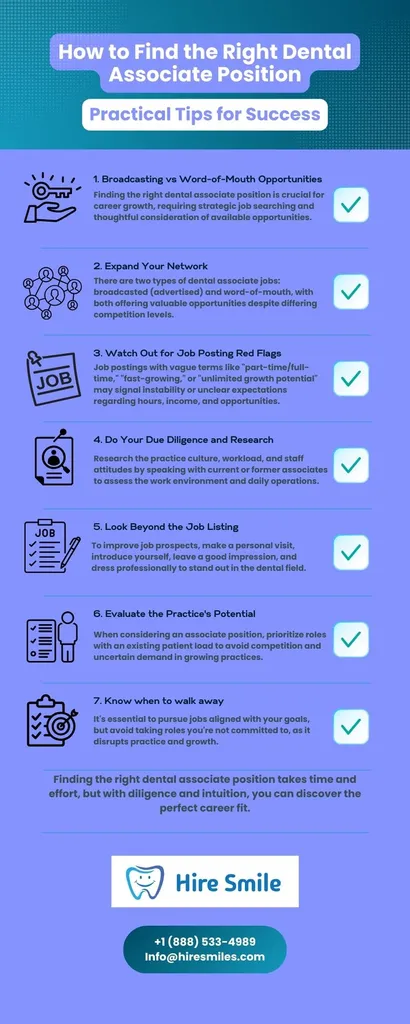Finding the right dental associate position bears a whole lot more on shaping your career than you can imagine. Since options are so many, one has to be thoughtful and strategic in conducting a job search. From being in the nascent stages of your career to wanting to make a change, here are some helpful insights on how to find the right fit and what to look for in those opportunities.
1. Broadcasting versus Word-of-Mouth Opportunities
When searching for dental associate opportunities, for all practical purposes, there are two types of job availability: broadcast and word-of-mouth.
Broadcasted jobs are advertised through classified ads, job boards, or career pages. These types of jobs have a high influx of applicants and, therefore, make them more competitive.
Word-of-mouth positions come through personal connections, professors, and mentors, or even through local dental labs. Many dentists believe that the best opportunities come through word of mouth because these are usually less advertised and more ‘blue-blood’ roles.
That might be true, but word-of-mouth jobs can give you a competitive advantage; don’t look down entirely on broadcasted roles. Many great positions are listed publicly, and some of the best opportunities could come out of responding to a well-advertised role.
2. Expand Your Network to Create Word-of-Mouth Opportunities
If you’re planning to draw upon the word-of-mouth job market, then there are a number of ways to maximize your chances. Networking is the name of the game. Contact dental labs in the location where you’d like to work because they often have insider information about which practices are seeking employees. Professors, clinical demonstrators, and other dentists may be excellent sources as well.
It pays to be out in front. You never know when opportunities might fall into your lap. By reaching out and building relationships, you increase the chances of finding that perfect job through a personal connection.
3. Watch Out for Job Posting Red Flags
Receiving broadcast job postings, here are some catch phrases that raise a red flag. For example:
“Part-time/ full-time”: This may suggest that the practice is not busy enough to justify a full-time position but may be hoping to find someone who will help them fill in. This makes it hard to predict your hours and your income.
“Fast-growing”: While growth is generally positive, it can sometimes mean that the practice isn’t fully established or that patient demand is still below expectations.
In-house specialists: Having endodontists or periodontists in your practice may decrease your opportunities to deal with more complicated cases. Those cases will be referred to the specialists. Be cautious of any job posting that apparently promises the world without clear specifics. Phrases like “unlimited growth potential” should raise cautionary flags because they are almost always accompanied by some pretty vague guarantees.

4. Do Your Due Diligence and Research
Do your homework before taking any position. Speak with current or former associates for an idea about the practice culture and workload-what a typical daily schedule consists of, how busy the practice is, what types of procedures you will be performing. Check out the hygiene columns and inquire about the ratio of hygienists to dentists, which can be a good indicator of how well the practice operates.
It would be advisable too, to see the attitude of the staff hygienist, assistants, and front desk personnel towards the practice; this will tell much about the work environment.
5. Look Beyond the Job Listing
To get noticed and make a better chance at securing a good position, think outside the box of the standard application process. If you know of any place with which you would particularly like to work, do not be afraid to make an appearance. Introduce yourself, show your interest, and leave a good impression. This personal touch will sometimes get your résumé to the top of the heap.
When visiting, dress appropriately—not too formal, but clean and professional. Dentistry is about connecting with people, and demonstrating that you’re personable and approachable can go a long way.
6. Evaluate the Practice’s Potential
If the practice is offering an associate position, it’s essential to determine if it’s the right fit for you. Ideally, look for a role where you’ll be taking over a patient load from a departing dentist. This ensures that you’ll have a steady stream of patients from day one.
Be cautious of positions where the practice is growing or desires to take on an associate. You may find yourself competing with the existing dentist for patients, and you can’t be sure demand will support you both.
7. Know when to walk away
Just as it is important to commit to a job that one is serious about, it is important to know when to acknowledge that the role simply is not a good fit. If you find yourself in a position that does not align with your goals or expectations, then do not be afraid to move on. Your career is yours and yours alone; life is too short to stay in a job that makes you unhappy.
That said, consider practice and the impact leaving has: do not take up a position when you are not really committed because of disruption to practice and patients. Take up only those roles that you see yourself growing in and thriving.
Final Thoughts
Finding the right dental associate position is a big decision that will mold your career. Take the time to find both broadcasted and word-of-mouth opportunities, do your due diligence, and most importantly, trust your instincts. Remember: there is a perfect fit waiting for you, and it’s worth the time to locate a position where you can grow and enjoy your work.
Good luck on your search, and remember that the perfect opportunity might be just around the corner!
Infographics






